Being Sikh in Trump’s America: ‘You have to go out of your way to prove you’re not a threat’

Balmeet Singh joined the swelling ranks of Sikhs targeted, in many cases, after being mistaken for Muslim -- a phenomenon that gained momentum after the Sept. 11 terrorist attacks.
Balmeet Singh stepped outside a burger shop in a strip mall to wish his 13-year-old cousin a happy birthday when the stranger squared up against him.
“So, you’re going to blow up this country?” the man said. “You’re trying to blow up this country?”
He threw a drink in Singh’s face, his long beard and burgundy turban the intended target. Then the man threatened to kill him.
A dozen people sat in the nearby patio. Singh scanned their faces. No one said anything. Singh had never felt so alone.
The September attack left the 31-year-old real estate agent among the swelling ranks of Sikhs targeted, in many cases, after being mistaken for Muslim — a phenomenon that gained momentum after the Sept. 11 terrorist attacks.
Sikh community leaders say they’ve seen another uptick since the 2016 presidential election and the Trump administration’s proposed immigration and travel bans. Those proposals, they argue, are fueling an intensified xenophobia.
Sikhism, which has roots in the Punjab region of northern India and eastern Pakistan, is the world’s fifth-largest religion.
The FBI began collecting data on anti-Sikh, anti-Arab and anti-Hindu hate crimes for the first time in 2015, though the Sikh community has struggled for years to accurately track those crimes. Only six of the incidents in the most recent FBI report were anti-Sikh hate crimes, but the bureau has said it takes years to get an accurate accounting.
Sikh advocacy groups argue such incidents are under-reported and do not include other hate-filled attacks, such as discrimination or hate speech — a concern buoyed by law enforcement data. Many cities either did not report hate crimes or reported zero hate crimes, according to the FBI report.
“The overwhelming motivation for these attacks or intimidation incidents are part and parcel of a growing wave of hostility based on perception that Sikhs are Muslim,” said Suman Raghunathan, executive director of the advocacy group South Asian Americans Leading Together.
Advocacy groups use statistics on anti-Muslim hate crimes to help determine whether Sikhs are at higher risk, said Rajdeep Singh Jolly, interim managing director of programs at the Sikh Coalition.
“At the moment, the risk of anti-Sikh hate crime is high,” Jolly said. “Any time there is a flare-up in anti-immigrant rhetoric, we see an uptick in even an apprehension about hate crimes.”
While some of the violence against Sikhs stems from misconceptions about their background — attackers assume they are Muslim or Middle Eastern — experts say much of it is fueled by a prejudiced response to their darker skin, beards or turbans.
Earlier this year, two Sikhs and two other Indian men were shot in attacks in Kansas, Washington and South Carolina. In two of the incidents, authorities said the shooters expressed a variation of the same sentiment: Go back to your country.
“It’s very similar to how I felt after 9/11,” Singh said. “It’s not enough to simply be who you are and exist. You have to go out of your way to prove you’re not a threat.”
Community members are working to strike a balance in its efforts to educate the public about Sikhism — aiming to differentiate themselves through awareness campaigns and local outreach without appearing to condone attacks on Muslims and other minorities.
“Sikhs began migrating in large numbers with my parents’ generation,” Jolly said. “They just didn’t have the time or resources or the know-how of how to do lobbying. To some extent, we’re catching up.”
A disturbing trend
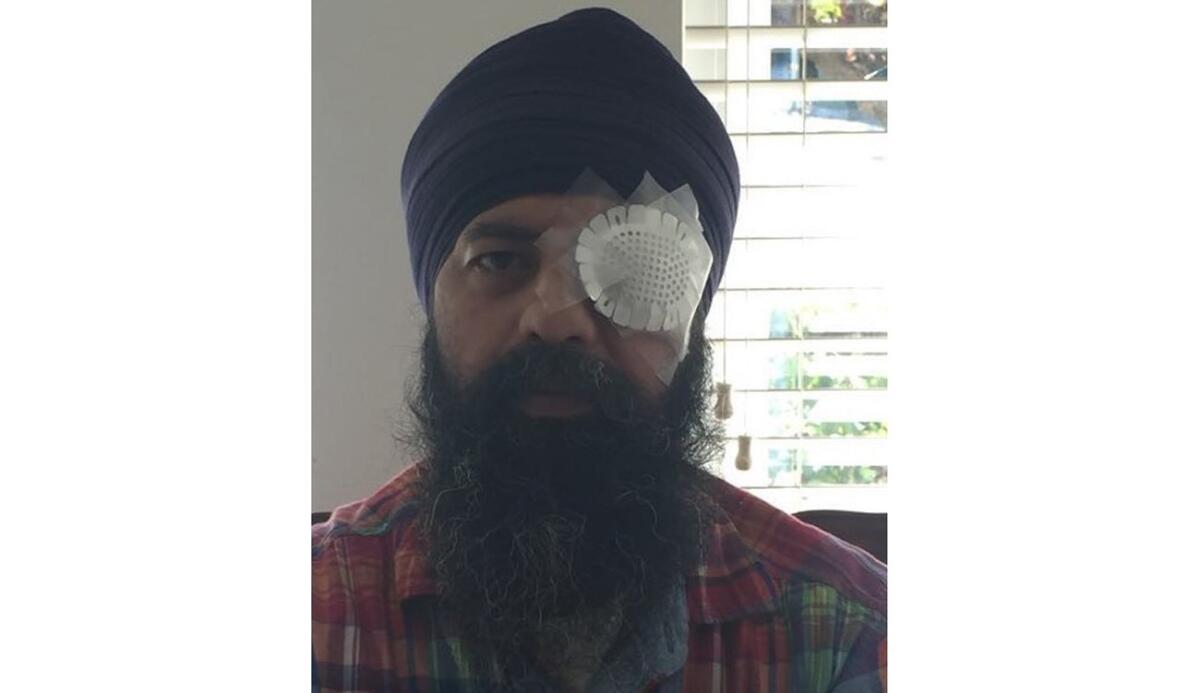
Maan Singh Khalsa thought nothing of the men in the white Ford F-150 who pulled up next to him at a red light in Richmond, Calif. Then they began throwing beer cans at him.
When the light turned green, Khalsa drove off and called 911. The truck followed.
At the next red light, two men got out of the pickup and ran up to Khalsa’s car. They reached into the open window, punched his face and yelled profanities. The attackers cut off bits of his hair. They stabbed his finger as he tried to shield himself. His finger was later amputated.
“By cutting my hair, the attackers did not just attack my body; they attacked my dignity, my spirit, my faith, my religion and my entire community,” Khalsa, 42, said later in a court statement.
Khalsa said he didn’t even think about rolling up the window when the men approached him. Instead, he tried to reason with his assailants, saying, “There is a misunderstanding; I am your brother.”
The Texas men were sentenced to three years in prison for the September attack. When addressing his attackers in court, Khalsa again tried to get them to understand.
“I hope that you will learn about me and my community and one day consider me your brother too,” Khalsa said.
High profile attacks on Indian Americans
- September 2016: A Sikh man is brutally beaten and his hair is cut off while stopped at a red light in Richmond, Calif.
- February 2017: Two Indian men are shot, one of them fatally, at a bar in Olathe, Kan. The shooter reportedly told them to go back to their country.
- March 2017: Two Sikh men are attacked in separate shootings, one in Washington and another in South Carolina. The man shot in South Carolina was killed.
On Sept. 15, 2001, Balbir Singh Sodhi was planting flowers with a landscaper outside his gas station in Mesa, Ariz. On his head rested a turban.
As he drove past in his pickup, Frank Roque, a 42-year-old machinist, opened fire with a .38-caliber handgun. Sodhi, 49, was shot multiple times. He crumbled to the ground, fatally wounded — the first Sikh killed after 9/11 by someone bent on killing a Muslim.
The next day, when police arrested him, Roque yelled, “I stand for America!”
Before the attack, Roque told a waiter at an Applebee’s that he was going to go out and “shoot some towel heads.” He said that “all Arabs should be shot” and that he wanted to “slit some Iranian throats,” according to media reports.
Sodhi’s brother, Rana, didn’t learn of his brother’s death until the next day, when a gas station employee called. He thought his brother must have been shot in a robbery. Then it sunk in that his brother was killed outside the shop. Sodhi had been shot because of what his beard and turban meant to his killer, his brother realized.
“We didn’t know there was so much ignorance,” Rana Sodhi said.
A link between political rhetoric and crime
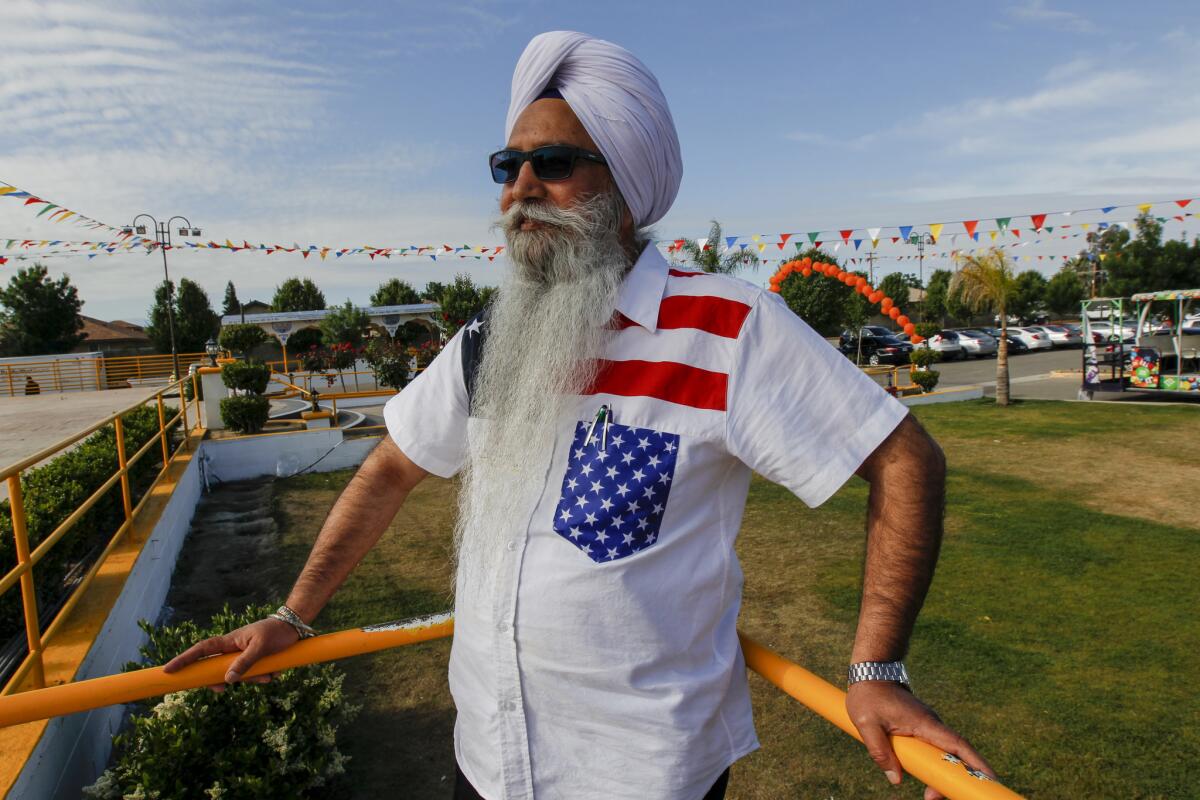
The FBI began tracking hate crimes against Sikhs in response to community advocacy following a mass shooting at a gurdwara in Oak Creek, Wis., in 2012. Six people were killed, and three were critically wounded. The gunman shot himself in the head.
Sikhs have been attacked at least a dozen times since, but it was a shooting in Kansas in February that again put the Indian community on edge. In that attack, two men were shot by a man who reportedly believed he was shooting Iranians.
Valarie Kaur, a Sikh civil rights advocate, said she’s spent years pushing back against the mistaken identity narrative because xenophobia targets “all of our communities at once,” not just Sikhs.
“It seems to make very little difference if the brown, bearded man with the turban calls himself a Sikh and not a Muslim,” she said. “They read us as un-American.”
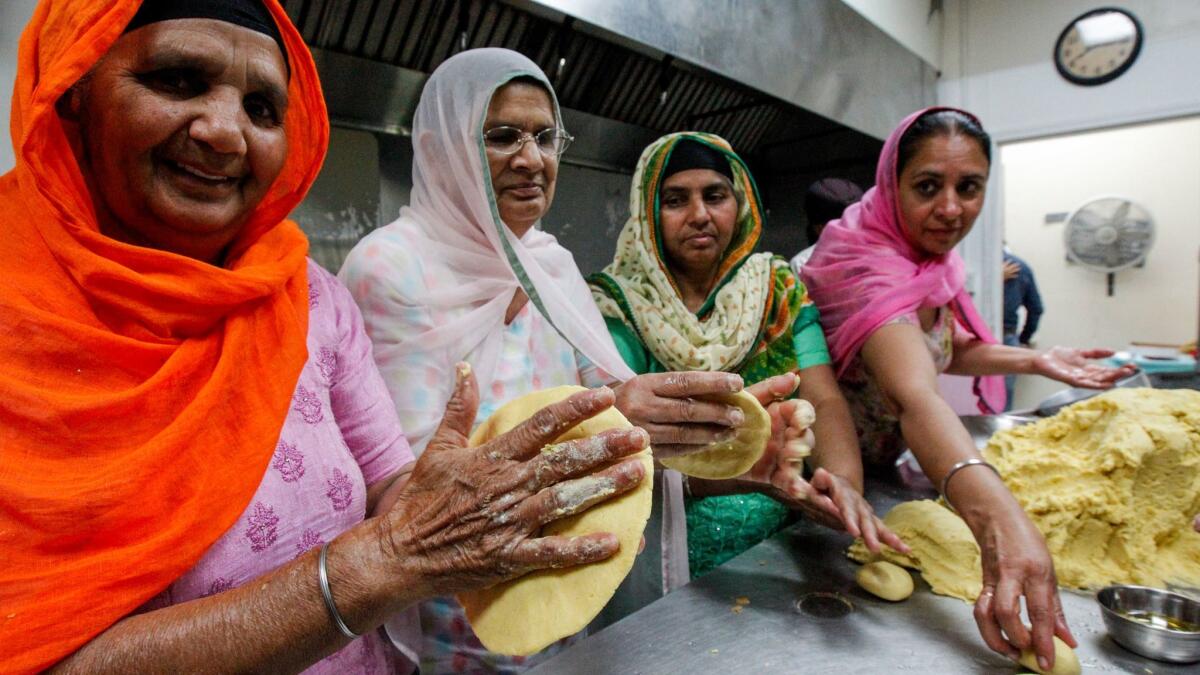
A correlation between President Trump’s talk on immigration and an increase in hate crimes doesn’t necessarily point to causation, said Brian Levin, director of the Center for the Study of Hate and Extremism at Cal State San Bernardino, but there could be a link between political rhetoric and crime.
When then-President George W. Bush called for tolerance after 9/11, anti-Muslim hate crimes dropped dramatically across the country, he said. Those crimes spiked when Trump, then a presidential candidate, first proposed his “Muslim ban” after the San Bernardino terrorist attack in December 2015, Levin said.
The average for anti-Muslim hate crimes at the time was about 13 per month, he said, but there were 15 anti-Muslim crimes within five days after Trump’s speech.
“Sikhs are getting swept up in that,” Levin said.
Carrying proof of citizenship
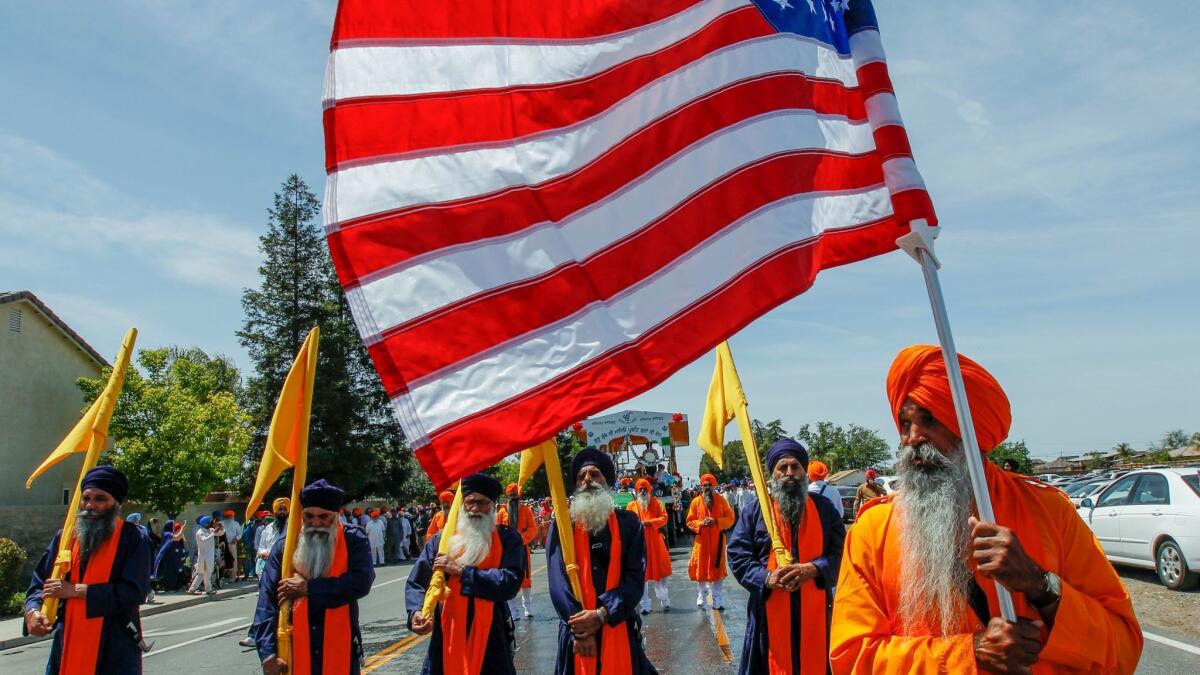
In the days following Trump’s first travel ban order, conversations in Balmeet Singh’s family began to shift from asking about each other’s day to whether they would need to prove they are Americans. Over dinners, they discussed keeping copies of their passports in their car and scanned copies onto their phones.
They bought his youngest sister a panic button in case anyone harassed her.
Singh, who lives in Bakersfield with his parents, grandparents and sisters, said it was surreal for all three generations to sit down and talk about their identity.
“Suddenly, all of us have to discuss that it’s not enough to be who we are,” he said. “We suddenly have to prove ourselves.”
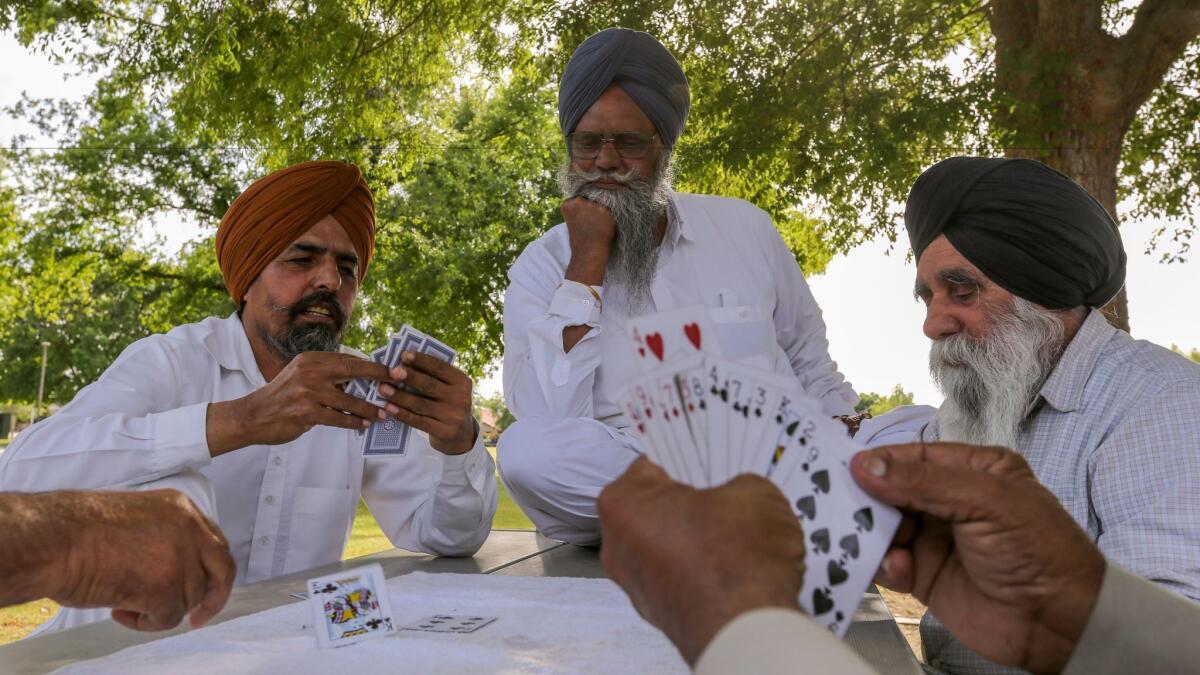
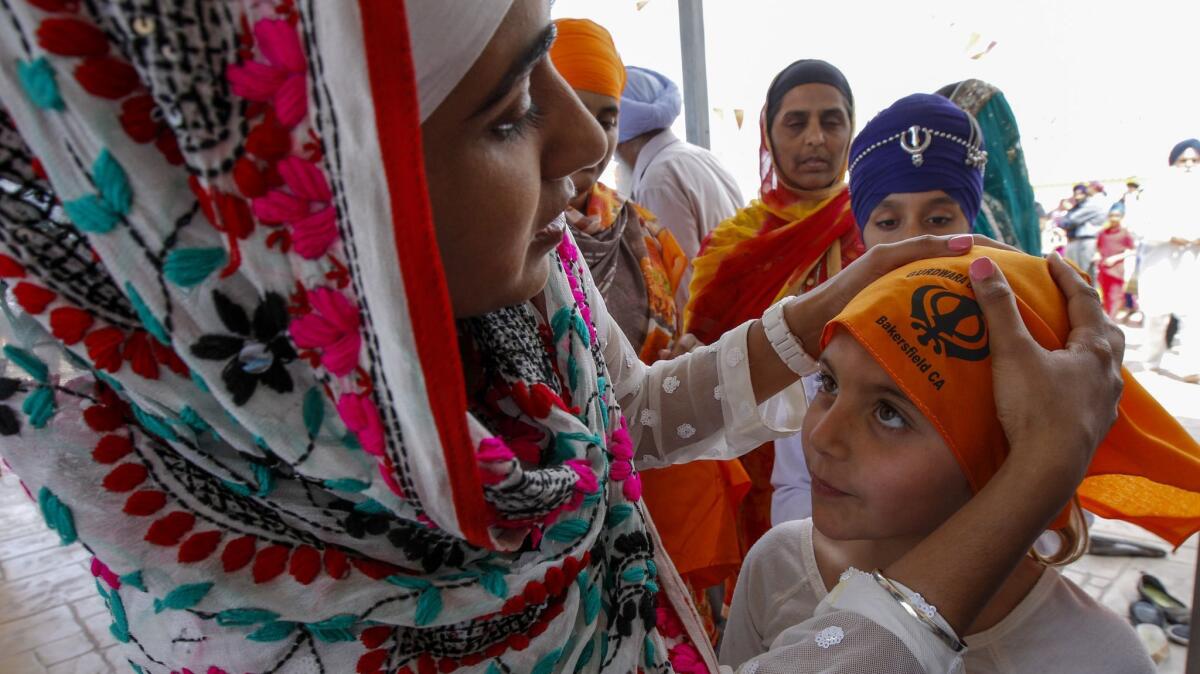
About 500,000 Sikhs live in the United States, with much of that population settled in California and New York, according to the Sikh Coalition.
Sikhs represent a small portion of the Indian population, but community estimates place more than 30,000 in the central San Joaquin Valley. They comprise the majority of the local Indian population.
In an effort to familiarize the rest of the community with Sikhs, Singh’s father put up a billboard along the freeway with his photo and information about his medical clinic. His face is plastered on the left side of the sign, his hair wrapped in a black turban.
Forgiveness
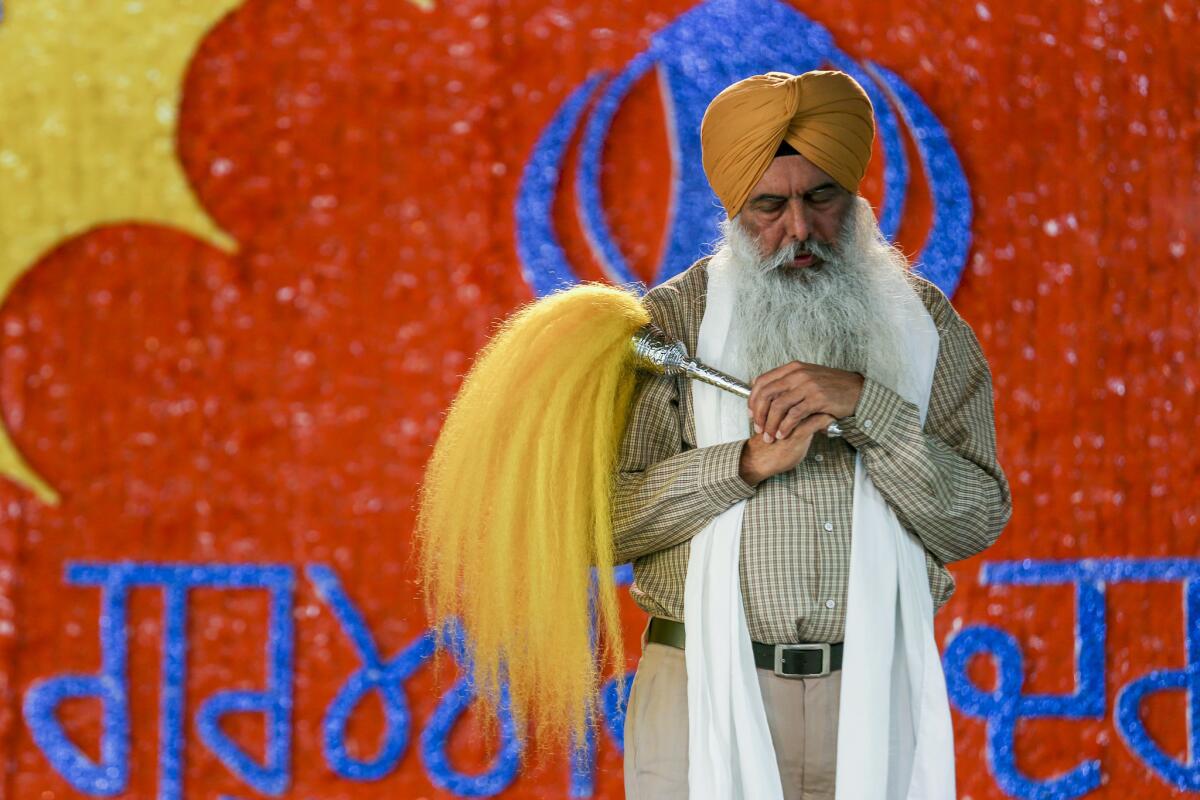
Just days after 9/11, Balbir Singh Sodhi, his brother Rana and other members of their gurdwara planned a Sunday news conference to educate the community about Sikhs. The day before, Sodhi called his brother and asked him to bring an American flag for the gas station.
Sodhi was shot dead 30 minutes later.
“A lot of us moved from India after 1984, when Sikhs were persecuted in New Delhi out in the open,” Rana Sodhi said. “We didn’t expect those kind of things from America.”
He spoke with his brother’s killer for the first time last year after Kaur, the Sikh civil rights advocate and a family friend, set up a phone call.
The three spoke for more than 20 minutes. Roque, who still is in prison, told Rana Sodhi that he was seething over the terrorist attacks when he pulled the trigger. He said he wasn’t a racist, and he did express remorse.
“I want you to know from my heart, I’m sorry for what I did to your brother,” Roque said, according to a recording of the conversation. “One day, when I go to heaven to be judged by God, I will ask to see your brother, and I will hug him, and I will ask him for forgiveness.”
Sodhi nodded, then replied: “We already forgave you.”
Follow me on Twitter: @sarahparvini
Sign up for Essential California
The most important California stories and recommendations in your inbox every morning.
You may occasionally receive promotional content from the Los Angeles Times.








